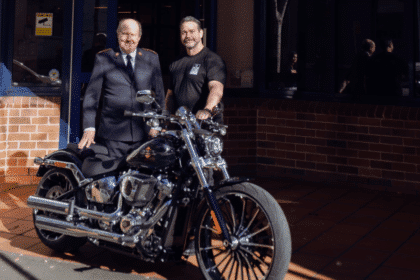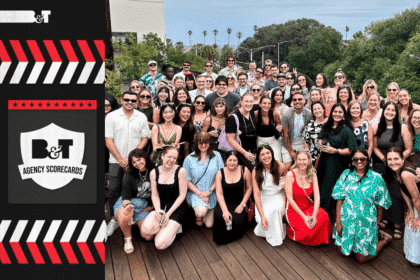Here, Mamamia CEO Nat Harvey writes that Australia should look at how podcasts were central to Donald Trump’s win in the US Presidential election.
As the dust settles after the US elections and analysis begins about how Donald Trump won so decisively, it’s true that there will be a confluence of reasons. What nobody on the left or right is arguing, however, is the seismic shift in influence from the old media to the new media, specifically podcasts.
Trump’s willingness to go to Austin, Texas and sit down with Joe Rogan for a three hour interview and Kamala Harris’ willingness to sit down with Alex Cooper for an interview on her show, Call Her Daddy were the two most talked-about media appearances of the campaign. Perhaps it shouldn’t have been such a surprise as research out of the US in the lead up to the vote showed that podcasts are the most trusted* source of media for registered voters, with 63 per cent per cent saying podcasts change their opinions on issues or topics in the news.
The Australian election is expected to take place in May and since the last election, “new media” has grown in both size and influence. I would LOVE to be a fly on the wall of the political party headquarters as they perform their own post-mortem while strategising about key messages and importantly, what platforms to get those messages out on.
With evolving consumption habits and audiences reconsidering what trusted media really is, it is obvious that along with key policies, the media plan from the 2022 election can’t be copied and pasted. The splits of investment must be adjusted significantly to make sure messages cut through and trusted platforms must over index in focus and spend.
This doesn’t just apply to political parties and elections though, my guess is that every marketer in the world will be re-evaluating their media mix this week and the role of “new media” post the US Election. How can Marketers build brand trust and drive action in new ways, using new media and lowering the reliance on performance and traditional media. Not saying at all that traditional media should be abandoned, but the splits of investment most certainly should be reviewed.
Back to looking at the US Election. There was certainly a lot of money spent by both sides. But what is really interesting is the level of conversation about the decision for both parties to appear on podcasts. Not only were the numbers enormous, dwarfing the capability of the traditional broadcast approach, but through leveraging the trust and deep engagement of the Call Her Daddy and Joe Rogan audiences, candidates had the ability to humanise themselves, go beyond a soundbite and create real connection with voters. The Democrats had huge door knocking and field infrastructure whereas the Republicans had none of that and clearly didn’t need it. Throughout this election cycle, Podcasts have been positioned as the new grass roots approach when it comes to driving social change and conversation.
Mamamia is the largest pure podcast network in Australia and the largest women’s media network in the country reaching 7.5 million Australian women every month. So we were thrilled to see Podcasts up in lights with candidates understanding how powerful, relevant and crucial podcasts and hosts are.
Podcast hosts transcend traditional media commentators where lines must be toed or personal viewpoints are discouraged. Podcast hosts cross multiple demographics and connect in a way that is simply unrivalled by other platforms. That’s why millions of Australians flock to podcasts every month. To be part of the conversation and to hear from the people they trust the most.
Contrary to popular belief, women don’t just care about women’s issues. We care about the economy, about job security, the health of our friends and family, the safety of our country and what is going on outside our borders. When most voters are swing voters, you really can’t afford to ignore women, or assume you can get to them with mass, broad media. They might contribute to a number/ a reach goal but you won’t be able to connect with them like you can on our platforms.
Here’s some fun facts: 87 per cent of our audience have thought about buying a product/ service after hearing about it on Mamamia podcasts. And if you want to get into the powerful dark social environments where women trade ideas, thoughts and look for support… well, 2 in 3 of our audience have told someone about a product/ service they have heard about on our Podcasts. Seems like an incredibly important platform to place your messages and an influential audience to be engaging with over the next six months if you are trying to grow trust and turn voters.
So with all that in mind, this is an open invitation to Prime Minister Albanese and Opposition Leader Peter Dutton to come onto No Filter, Mamamia Out Loud and The Quicky. If they want to connect with Australian women, they need to start with Mamamia. The traditional 30-second radio ad just won’t cut it. If politicians and leaders of our country want to understand the issues that are causing women concern and what they really want to hear about, come and talk to us. We would be more than happy to host a round table with our audience and our editorial team. Because if you aren’t addressing our genuine concerns, our audience absolutely will find someone else to vote for.
Mamamia has actually hosted every sitting Prime Minister and most opposition leaders since 2008 with the exception of Tony Abbott when he was Prime Minister and Scott Morrison in
the last election.
Despite repeated invitations through his office, Morrison, who was running against Albanese repeatedly refused to talk to any of our journalists or podcasts hosts at Mamamia, preferring to focus on legacy media such as 60 Minutes and the Australian Women’s Weekly. Anthony Albanese, however, did a No Filter with Mia Freedman which was one of the biggest episodes of the year.
This post originally appeared on LinkedIn and was republished with Mamamia’s permission.
*Source Voxtopica Survey, The Podcast Influence. September 2024








